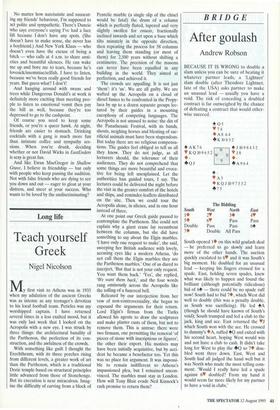BRIDGE
After goulash
Andrew Robson
BECAUSE IT IS WRONG to double a slam unless you can be sure of beating it whatever partner leads, a 'Lightner' slam double (after Theodore Lightner, late of the USA) asks partner to make an unusual lead — usually you have a void. The risk of conceding a doubled contract is far outweighed by the chance of defeating a contract that would other- wise succeed.
4 A K 7 6
V K (2 10 9 6 5 2
• - • Q J 4 C) 5 • 74 ♦ A8 64 • K 10 8 3 2
4 J 10 9 8 4 3 2 VJ8
• - + A 9 6 4
N
W E -
V A 3
♦ K0J1097532 +75 South 1♦ 5♦ Double 7* The Bidding
West North 2V 3♦ 6V Pass Pass Pass Double All Pass East 4, Pass 64
South opened 1♦ on this wild goulash deal — he preferred to go slowly and learn more of the other hands. The auction quickly escalated to 6V and it was South's big moment. He doubled for an unusual lead — keeping his fingers crossed for a spade. East, holding seven spades, knew what was likely to happen and found the brilliant (although potentially ridiculous) bid of 64 — there could be no spade ruff now! South had to bid 7•, which West did well to double (this was a penalty double, as South was sacrificing). He led 4A (though he should have known of South's void); South trumped and led a club to the jack, king and ace. East returned the •J which South won with the ace. He crossed to dummy's ♦A, ruffed 40 and exited with his second heart, hoping West would win and not have a club to cash. It didn't take long for West to play the +Q so 7+ dou- bled went three down. East, West and South had all judged the hand well but it was North who made the most telling com- ment: 'Would I really have led a spade against 6V doubled? From my hand it would seem far more likely for my partner to have a void in clubs.'


















































 Previous page
Previous page